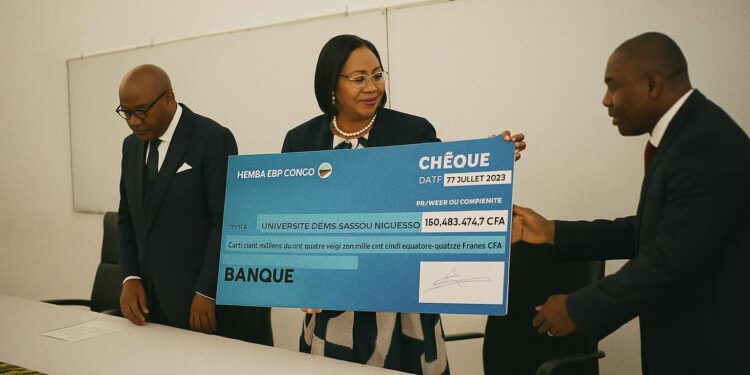Symbolic cheque, strategic timing
At the modern campus of Kintélé, the ceremonial hand-over of a 160 683 674 CFA cheque from Hemla E&P Congo to Denis Sassou Nguesso University unfolded with studied choreography, mirroring the delicate ballet that often accompanies resource-driven diplomacy in Central Africa. Coming midway through the academic recess yet only weeks after the Ministry of Hydrocarbons reiterated its commitment to the 2016 Hydrocarbon Code’s local-content provisions, the donation’s timing suggests an alignment of corporate foresight with governmental priorities rather than mere philanthropy.
Corporate social responsibility as knowledge diplomacy
Hemla E&P’s administrator Abime Laurier invoked the universal development mantra that “education is the cornerstone of sustainable growth”, framing the grant as a calculated investment in Congo-Brazzaville’s human capital. The company’s recent environmental and social impact report already placed tertiary-education support among its top five expenditure lines, a pattern echoed by peer operators such as TotalEnergies and Eni in Pointe-Noire (Extractive Industries Transparency Initiative, 2024). By positioning laboratory microscopes alongside seismic acquisition budgets, Hemla E&P is quietly recasting corporate social responsibility into an instrument of knowledge diplomacy, securing both community goodwill and future technical talent.
Legal architecture of local-content compliance
The Republic of Congo’s Hydrocarbon Code obliges operators to allocate at least one per cent of annual gross operating expenditure to capacity-building initiatives that demonstrably benefit Congolese nationals. Minister Bruno Jean Richard Itoua’s presence at the ceremony was not merely symbolic; it served as a public audit of Hemla E&P’s compliance as well as a gentle nudge to less proactive concessionaires. Analysts at the African Energy Chamber note that between 2021 and 2023 only forty-six per cent of operators met the code’s education-related threshold, a deficit the administration is keen to correct without dampening investor sentiment.
Laboratory modernisation and curricular shift
University president Professor Ange Antoine Abena emphasised that the microscopes, tensile-testing machines and environmental sensors to be procured will “transform the teaching experience, allowing students to handle industry-grade tools before their first internship”. Current enrolment in applied sciences has surged by twenty-two per cent since 2020, outpacing infrastructure expansion (UNESCO Institute for Statistics, 2023). The injection of equipment therefore acts as both a pedagogical catalyst and a logistical release valve, alleviating pressure on overstretched laboratories while raising the empirical rigour expected of future petro-geologists and environmental auditors.
Regional talent pipeline and soft-power dividends
Beyond campus walls, the modernisation push resonates with the Central African Economic and Monetary Community’s Vision 2025, which identifies cross-border mobility of skilled labour as a growth accelerator. By anchoring advanced instrumentation in Brazzaville, authorities aim to stem the outbound flow of students to Yaoundé or Abidjan and to attract regional doctoral candidates, thereby converting UDSN into both a magnet and a multiplier of expertise. Diplomatic observers contend that such academic gravitas translates into soft-power leverage during multilateral negotiations on climate finance and blue-economy corridors, arenas where scientific credibility increasingly informs bargaining power.
From isolated gesture to sector-wide benchmark
Minister Itoua’s exhortation that “other players should match Hemla’s example” signals an emerging norm: oil revenues must visibly cycle back into societal assets if the social licence to operate is to remain intact. Early indications suggest resonance; two mid-size service companies have already inquired about sponsoring digital-mapping modules at the Institute of Geographic Sciences, according to ministry officials. While sceptics may caution against over-reliance on corporate largesse, proponents argue that synergy between state oversight and private initiative can accelerate the qualitative leap the national higher-education plan seeks by 2030 (National Development Plan, 2022-2026).
Measured optimism for Congo’s knowledge economy
With a single cheque, Hemla E&P Congo has nudged the debate on resource governance from revenue distribution to knowledge creation. The move neither absolves the energy sector of broader environmental obligations nor guarantees immediate academic rankings, yet it underscores a pragmatic pathway where hydrocarbon wealth underwrites the intellectual infrastructure of a post-oil era. In a region where headlines often oscillate between boom and volatility, the discreet modernisation of a university laboratory offers a narrative of continuity, one in which the state, private enterprise and academia converge toward a shared ambition: translating subterranean abundance into sustainable, home-grown expertise.











































